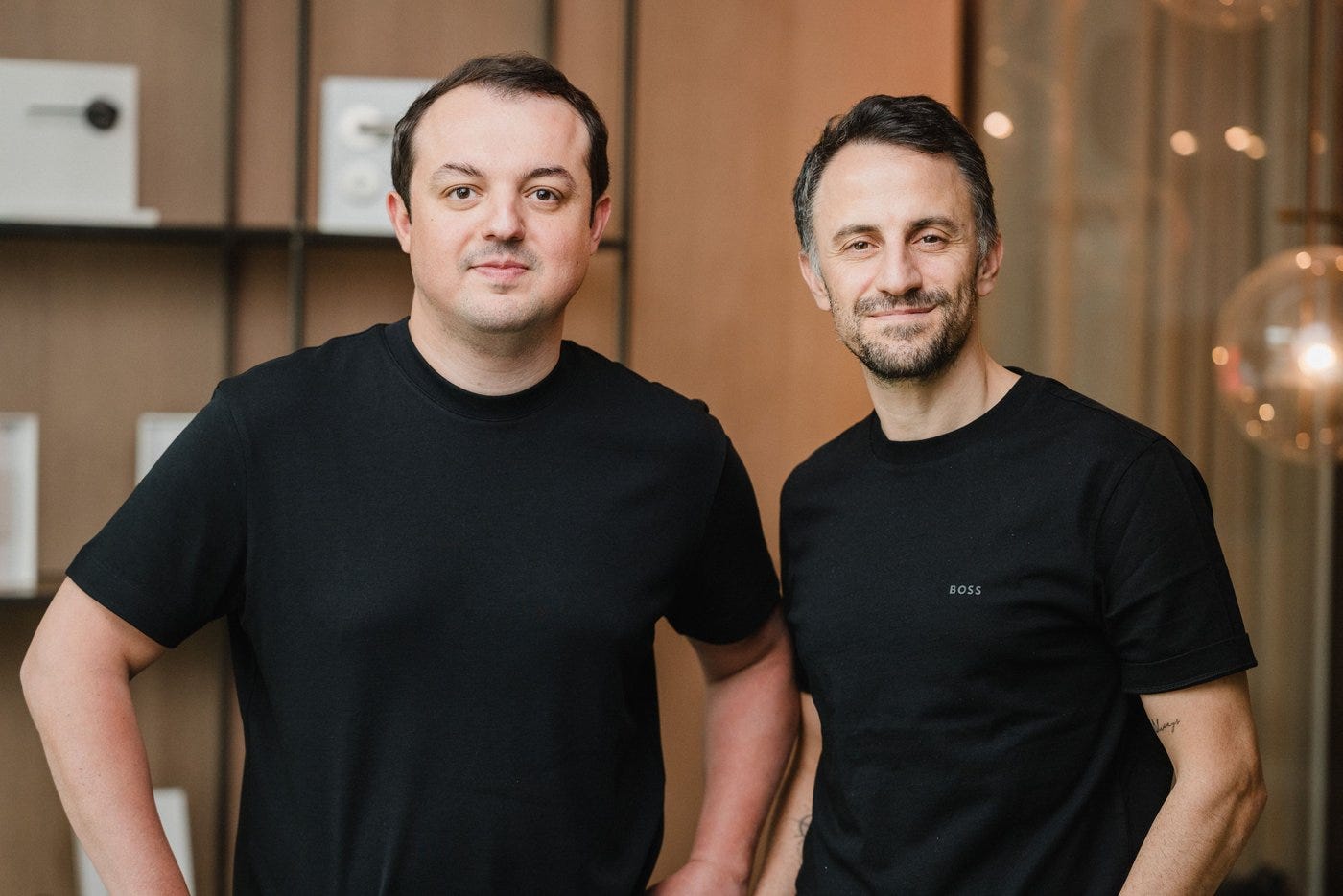Shopify CEO Tobias Lütke Says Stablecoins Are a Natural Way to Transact on the Internet 🇨🇦
We're also covering Ramp's $16B valuation 🇺🇸, mystery Adyen billionaire's $35M bet 🇳🇱, Grab disrupting insurance 🇸🇬, South Korea's $368K stablecoin rules 🇰🇷 & Stripe's defective AI 🇸🇬
🇨🇦 Shopify CEO Tobias Lütke Says Stablecoins Are a Natural Way to Transact on the Internet
Shopify will let select merchants accept USDC stablecoin payments by late June through a partnership with Coinbase and Stripe.
Shopify CEO Tobias Lütke (right), who sits on Coinbase's board and revealed the plan at a Coinbase event last Thursday, said on X that "stablecoins are a natural way to transact on the Internet" and worked with Coinbase to build the Commerce Payment Protocol. This smart contract system handles chargebacks and refunds, problems that have made crypto payments difficult for regular retail.
The technical innovation extends beyond basic transactions. Lütke also revealed on X that the system will enable new merchant incentives like "1% cash back in the future" while remaining "totally transparent to merchants" who will receive "normal local currency payouts the same as usual" unless they specifically choose to keep payments in USDC.
Coinbase CEO Brian Armstrong (left) sees broader implications, writing on X that "onchain payments are the future" and urging that "every business should develop a plan to accept stablecoin payments." The Commerce Payment Protocol they developed with Shopify is deliberately designed as "an open standard that any e-commerce solution or payment platform can integrate."
The timing appears strategic as Amazon and Walmart have reportedly held internal discussions about launching proprietary digital currencies or partnering with existing stablecoin providers, with some Amazon concepts centering on "a proprietary coin for use in its online marketplace." Expedia and several airlines are also considering similar strategies.
The primary motivation is simple economics. Credit card networks cost retailers billions annually in fees, and stablecoins could allow retailers to forego those intermediaries.
This merchant-led push is gaining momentum as the U.S. Congress advances the Genius Act, which would create a legal framework for stablecoin use in the United States. The legislation recently passed a procedural vote, potentially opening the door for more aggressive merchant adoption of stablecoin payments.
Sources: Global Fintech Insider, Fortune & New York Post
🇺🇸 Eric Glyman Implies Amex Products Have Not Evolved Much Since the 1800s After Raising at a $16 billion Valuation
Ramp CEO Eric Glyman delivered a pointed attack on American Express during a CNBC interview last week. The comments gained added significance when Bloomberg later reported his spend management and corporate card startup had secured a $16 billion valuation following a $200 million funding round led by Peter Thiel's Founders Fund.
The deal represents a significant leap from the company's $13 billion valuation just three months ago. Serving over 40,000 companies, double last year's count, Ramp's fast growth could help explain its meteoric valuation rise that allowed it to eclipse rivals Airwallex's $6.2 billion valuation and Brex's $12.3 billion valuation.
While Ramp faces many fintech competitors founded around the same time, Eric Glyman seems to be according more mindshare to an older one: American Express. Speaking on CNBC, Glyman took a veiled but unmistakable shot at American Express. "We are going up against juggernauts, companies that have existed since the 1800s and I think have not evolved their product too much since then either," he said. The reference clearly targeted Amex, which launched in 1850 as a freight forwarding company before evolving into today's payment network and credit cards issuer.
Glyman continued his assault on American Express by taking aim at Amex's points system. "In contrast to many of our competitor working really hard to make their clients spend more money and earn more points, we think most business owners wants to spend less," he said.
Sources: Bloomberg, CNBC & Global Fintech Insider
🇳🇱 Billionaire Adyen Co-Founder Arnout Schuijff Raises $35M for Hospitality OS Startup Tebi
Billionaire Adyen co-founder Arnout Schuijff, whose picture strangely can’t be found online, raised €30 million ($35 million) in Series B funding for his Amsterdam-based hospitality operating system startup Tebi. Born from a simple point-of-sale app that Schuijff built for his friend's bar in 2012, Tebi has evolved into an all-in-one platform that unifies payments, reservations, kitchen displays, inventory, and bookkeeping for hospitality businesses, co-founded in 2021 with fellow Adyen veteran Rob Vonk as CTO.
The funding will accelerate international expansion starting with the UK market as the company targets Europe's €500 billion hospitality market where only 39% of restaurants use point-of-sale applications, compared to over 95% in the US. "Hospitality owners don't open their doors because they love integrating five different software systems or wrestling with manual inventory counts at 2 AM. They do it for the craft, the community, the look of delight in the customers' eyes," Schuijff explained. Tebi’s round was led by Alphabet's CapitalG, with participation from Index Ventures.
Source: Silicon Canals
🇸🇬 Super App Grab Uses Real Time Driver Data to Disrupt Singapore's $2B Motor Insurance Market
Grab, a Singapore-based super app that provides ride-hailing, food delivery and digital payments (GrabPay), plans to launch motor insurance products tailored for its network of private-hire drivers in Singapore. The new offering, GrabInsure, already secured regulatory approval from Singapore's Monetary Authority (MAS). Grab, which dominates the city-state's ride-hailing market with 50.2% market share, could bypass traditional insurance companies by leveraging real-time driving data to calculate premiums and offer and offer usage-based pricing. The move threatens Singapore's established motor insurance hierarchy such as Income Insurance MS First Capital and AIG.
Source: Fintech Singapore
🇰🇷 South Korea Allows Stablecoin Issuance With Only $368K Equity Capital Requirement
South Korea's ruling Democratic Party has proposed the Digital Asset Basic Act, allowing local companies to issue stablecoins, requiring only 500 million won (368,309 USD) in equity capital and that issuers keep 1 to 1 won in reserve. The legislation comes as newly elected President Lee Jae myung fulfills his campaign pledge to boost the country's already massive crypto market, where over 18 million people (more than a third of the population) actively trade crypto. Stablecoin trading has exploded in South Korea, with transactions involving USDT, USDC, and USDS reaching 57 trillion won (42 billion USD) during the first quarter alone on the five major Korean exchanges. However, the initiative faces pushback from Bank of Korea Governor Rhee Chang yong, who warned that non bank stablecoins could undermine monetary policy effectiveness. The news has already sparked a rally in local fintech stocks, with Korean super app KakaoPay Corp shares jumping 18% last Tuesday on expectations of won-based stablecoin opportunities.
Source: Bloomberg
🇮🇱 Ex Googler Gal Sagie Secures $40M to Protect Crypto Companies From Being Hacked
Israely cybersecurity start-up Hypernative, which uses AI to detect blockchain attacks before they occur, has secured $40 million in Series B funding. Co-founded in 2022 by former Googler and current CEO Gal Sagie (pictured above) along with CTO Dan Caspi, the Tel Aviv-based fintech monitors blockchain transactions in real-time to identify suspicious patterns that precede crypto exploits, serving over 200 customers who collectively protect more than $100 billion in crypto assets. "We know how to classify that preparation and then essentially front-run their attacks before they're actually triggering it," CTO Dan Caspi told Axios, noting the platform detected over $2.2 billion in potential losses from hacks and exploits in 2024 alone. Led by Ten Eleven Ventures and Ballistic Ventures with participation from StepStone Group, Boldstart Ventures and the IBI Tech Fund, the round brings the total funding for Hypernative to $67 million.
Source: Axios
🇺🇸 Stripe Acquires Crypto Wallet Provider Privy to Control Entire Stablecoin Value Chain
Stripe has acquired New-York based crypto wallet provider Privy for an undisclosed sum to own both the payment processing and wallet sides of the stablecoin business, according to reports. Bridge, which Stripe bought for $1.1 billion, allows merchants to accept stablecoin payments from customers, while Privy provides embedded wallet technology with 75 million accounts and partnerships with trading platform Hyperliquid and NFT marketplace OpenSea, allowing businesses to offer their clients crypto wallets directly integrated into their platforms. Co-founded in 2021 by CEO Henri Stern (right) and CTO Asta Li (left), Privy will continue operating as an independent product under Stripe's umbrella.
Source: Payments Journal & Global Fintech Insider
🇺🇸 Neobank Chime Shares Surge 37% on First Day After $864M IPO
Neobank Chime saw shares jump 37% on its trading debut after raising $864 million in its initial public offering, giving the San Francisco-based fintech a market value of $13.5 billion. Founded by CEO Chris Britt (pushing the button) and Ryan King (front center), the company sold 26 million shares at $27 each, above its marketed range of $24 to $26, with the offering attracting investor orders for more than 20 times the available shares according to Bloomberg. The fee-free neobank, which partners with Bancorp Bank and Stride Bank to offer banking services without holding its own charter, serves 8.6 million active users and generates most of its revenue from the interchange fees generated by its branded debit and credit cards.
Source: Bloomberg
🇲🇽 Mexican Neobank Hey Banco Deploys AI Coach to Help Customers Make Better Financial Decisions
Mexican neobank Hey Banco is betting on artificial intelligence to differentiate itself in the crowded digital banking market, with parent company CEO Manuel Rivero announcing plans to expand its AI assistant "Havi" beyond basic customer service to include a personal finance coach that will analyze budgets, detect small expenses, and help identify spending patterns. Currently handling 40% of customer interactions, Havi will soon be enhanced with financial education capabilities to help users understand their current financial situation and follow personalized improvement plans, Rivero told El Sol de México. "The question is how to help customers make better decisions. How do we make them feel like they have an advisor as good as private banking, but without needing a lot of money?" Rivero explained, noting that digital banks cannot simply offer online versions of traditional products in Mexico's still-developing fintech ecosystem. The strategy comes as Hey Banco continues its corporate restructuring process to spin off from parent company Banregio, with the separation expected to conclude this summer, pending approval from Mexico's banking regulator CNBV.
Source: El Sol de Mexico
🇸🇬 Yacht Rental Boss Exposes Stripe AI Issue That Appear to Hit Many Small Businesses
Stripe's AI wrongly shut down Singapore yacht rental company Sea Experiences after classifying it as a "commercial cruise" business, prompting CEO Bertrand Bidaud to blast the payments giant in a LinkedIn post that revealed the problem appears widespread among merchants. Bidaud accused Stripe of using "poor AI that cannot distinguish between yacht rental and commercial cruises" and criticized the company for having no human customer service to fix automated mistakes. His post sparked dozens of comments from other business owners sharing similar problems with Stripe's automated compliance system, with one commenter writing "It should be illegal for companies to not offer a reasonable method to talk to a human." A Stripe employee eventually responded that Bidaud's account was restored after he filed an appeal, but the incident highlights growing problems with fintechs using AI to make business decisions without proper human oversight.
Source: Global Fintech Insider
🇩🇪 Former Delivery Hero Fintech VP Secure $32M for All in One Enterprise Payments Platform
Former Delivery Hero fintech VP Orkhan Abdullayev (left) and his colleague Emre Talay (right) have raised $32 million for their Berlin-based payments fintech Payrails, which provides an all-in-one platform for large enterprises to manage payment operations across multiple geographies. Led by HV Capital with participation from existing investors General Catalyst, Andreessen Horowitz and EQT Ventures, the funding brings total capital raised to $54 million for the startup founded in late 2021 after the duo built Delivery Hero's payment stack in-house. Payrails targets enterprise clients like Puma, Vinted, Just Eat and Flix who struggle to manage complex payment needs across different countries and payment providers, offering over 100 integrations including Stripe, fraud prevention solutions like Forter, and software products such as Salesforce through a single interface. The fintech, which is operating in over 30 countries across Europe and the Middle East, is planning to use the funding to add new payment methods and hire across its offices in Berlin, London, Paris, Dublin, Cairo and Dubai.
Source: Sifted
🇨🇦 Paynt acquires Canada’s E-xact Transactions to Bring Payment Processing With Tips to North America
Paynt, a UK-based payment processor focusing on the service industry in Europe where it processes £4bn (4.6 billion USD) annually, has acquired Canadian payments firm E-xact Transactions to accelerate its expansion in North America. The Canadian processor, which is processing over 3.5 billion CAD (2.6 billions USD) in transactions annually, will allow Paynt to add a new operational hub in Vancouver, Canada, to its North American operations currently based in Connecticut.
While Paynt faces many competitors in North America, Paynt’s management is betting that its unique features developed for the service industry will allow them to stand out: “One of our flagship solutions is a digital tipping platform focused on service industries, Paynt head of marketing Jānis Līcis explained to me, when I asked him how Paynt differed from Stripe. With a single payment, the customer pays the bill and leaves a tip, and we split that into two transactions, so the tip bypasses the business and goes directly to the employee at the moment of payment.”
Sam Kohli (pictured above), founder and CEO of Paynt, appointed John Paul Golino, a US payment payment exec, to the board of E-xact. Golino will lead the integration of E-xact into Paynt’s platform and steer go-to-market efforts across the region.
Sources : Global Fintech Insider & Fintech Global
Upcoming Fintech Events
🇮🇱 Money Tel Aviv will be held in Tel Aviv on June 18-19, 2025 ($83), with speakers such as Ido Shamash, head of payments at Wix & Ran Cohen, CEO at BridgerPay. (Note: maybe avoid flying there right now)
🇺🇸 Fintech South will be held in Atlanta on August 19-20,2025 ($600), with speakers such as Joshua Silver, CEO of Rainforest & Kristin Slink, fintech strategist at FIS.
🇨🇦 The Customer Experience for Financial Services Summit will be held in Toronto on September 18–19, 2025 ($995), with speakers such as Amit Mondal, VP & Head of Digital Analytics & Experimentation at Amex & Angela Crapsi, AVP of Operations at Flexiti/Questrade.
🇺🇸 Money 20/20 USA will be held in Las Vegas on Oct. 26-29, 2025 ($3,849), with speakers such as May Zabaneh, VP of Digital Currencies at PayPal & Dietrich Kuhlman, CEO of Navy Federal Credit Union
Who Am I?
Hi, my name is Julien Brault.
From 2017 to 2024, I was the CEO of Hardbacon, a fintech I co-founded, which reached 400,000 unique visitors at its peak.
A Google update ultimately sealed the company’s faith and I started this newsletter to keep myself busy in the aftermath.
Why share this?
Because my goal is to use my experience as an economic journalist, fintech entrepreneur and product manager to present the most essential fintech news from around the world through the eyes of an insider.
If you like what I do, feel free to share this newsletter and follow me on Linkedin, X, Reddit, YouTube, TikTok & Instagram, .
P.-S. : Once you refer a new subscriber to the newsletter using your unique share link, you'll receive a personalized social media shout-out from me to promote your work or professional profile. Just write to me at jrbrault@icloud.com once your referral is confirmed on our leaderboard and include your social media account(s) URL(s) and who you are.














